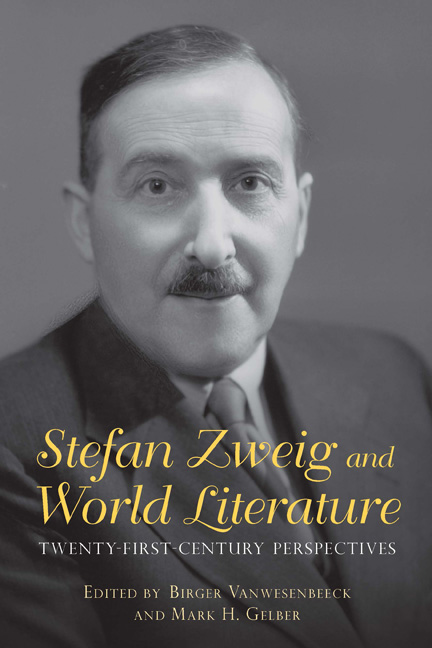1 - A Stefan Zweig Revival?
from Part I - Reception
Published online by Cambridge University Press: 05 May 2015
Summary
The first decade of the twenty-first century has witnessed a resurgence of cultural and critical interest in the works of Stefan Zweig (1881–1942). With the appearance of new English translations, along with two recent biographies, several motion pictures, and a bestselling French novel about his final days, renewed debate within the English-speaking world regarding the literary value of his work has been vigorous, and this calls for a critical reassessment of his legacy and works. Known in his time as perhaps the most translated serious author in the world and as a generous advisor cum networking agent for aspiring writers, including the young James Joyce, Zweig fell into near oblivion during the second half of the twentieth century. His writings and persona were often deemed too straightforward and sentimental for a modernism that championed impersonality and difficulty, and too Eurocentric for the era of decolonization that was the second half of the century. Thus dismissed on aesthetic as well as on political grounds, Zweig's works long seemed destined to survive primarily though their various film adaptations, such as Max Ophüls's successful 1948 Hollywood movie Letter from an Unknown Woman.
How is it possible to account for the sudden reemergence of Zweig's works—of his fiction as well as his non-fiction—at the beginning of the present century, more than a half-century after his name and fame tumbled as quickly as they had risen? How can one explain the once-again global appeal of a figure so seemingly and forbiddingly rooted in the culture of old Europe? “It's good to have him back,” Salman Rushdie wrote approvingly on the back cover of a new English edition of the only full-length novel Zweig published during his lifetime, Ungeduld des Herzens (Beware of Pity, 1939). In a recent New Yorker essay, Leo Carey similarly expressed hope that the “current Zweig revival” might also lead to a new appreciation of his biographical essays, which Carey considers the author's best work.
- Type
- Chapter
- Information
- Stefan Zweig and World LiteratureTwenty-First Century Perspectives, pp. 15 - 32Publisher: Boydell & BrewerPrint publication year: 2014

